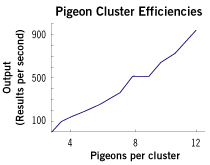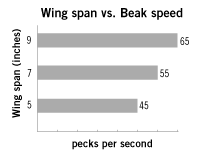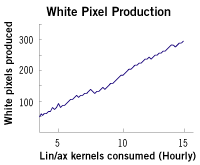As a Google user, you're familiar with the speed and accuracy of a Google search. How exactly does Google manage to find the right results for every query as quickly as it does? The heart of Google's search technology is PigeonRank™, a system for ranking web pages developed by Google founders Larry Page and Sergey Brin at Stanford University.

Building upon the breakthrough work of B. F. Skinner, Page and Brin reasoned that low cost pigeon clusters (PCs) could be used to compute the relative value of web pages faster than human editors or machine-based algorithms. And while Google has dozens of engineers working to improve every aspect of our service on a daily basis, PigeonRank continues to provide the basis for all of our web search tools.
Why Google's patented PigeonRank™ works so well
PigeonRank's success relies primarily on the superior trainability of the domestic pigeon (Columba livia) and its unique capacity to recognize objects regardless of spatial orientation. The common gray pigeon can easily distinguish among items displaying only the minutest differences, an ability that enables it to select relevant web sites from among thousands of similar pages.
By collecting flocks of pigeons in dense clusters, Google is able to process search queries at speeds superior to traditional search engines, which typically rely on birds of prey, brooding hens or slow-moving waterfowl to do their relevance rankings.
 When
a search query is submitted to Google, it is routed to a data coop where
monitors flash result pages at blazing speeds. When a relevant result
is observed by one of the pigeons in the cluster, it strikes a rubber-coated
steel bar with its beak, which assigns the page a PigeonRank value of
one. For each peck, the PigeonRank increases. Those pages receiving
the most pecks, are returned at the top of the user's results page with
the other results displayed in pecking order.
When
a search query is submitted to Google, it is routed to a data coop where
monitors flash result pages at blazing speeds. When a relevant result
is observed by one of the pigeons in the cluster, it strikes a rubber-coated
steel bar with its beak, which assigns the page a PigeonRank value of
one. For each peck, the PigeonRank increases. Those pages receiving
the most pecks, are returned at the top of the user's results page with
the other results displayed in pecking order.
Integrity
Google's pigeon-driven methods make tampering with our results extremely difficult. While some unscrupulous websites have tried to boost their ranking by including images on their pages of bread crumbs, bird seed and parrots posing seductively in resplendent plumage, Google's PigeonRank technology cannot be deceived by these techniques. A Google search is an easy, honest and objective way to find high-quality websites with information relevant to your search.
Data
 |
 |
 |
PigeonRank Frequently Asked Questions
How was PigeonRank developed?
The ease of training pigeons was documented early in the annals of science and fully explored by noted psychologist B.F. Skinner, who demonstrated that with only minor incentives, pigeons could be trained to execute complex tasks such as playing ping pong, piloting bombs or revising the Abatements, Credits and Refunds section of the national tax code.
Brin and Page were the first to recognize that this adaptability could be harnessed through massively parallel pecking to solve complex problems, such as ordering large datasets or ordering pizza for large groups of engineers. Page and Brin experimented with numerous avian motivators before settling on a combination of linseed and flax (lin/ax) that not only offered superior performance, but could be gathered at no cost from nearby open space preserves. This open space lin/ax powers Google's operations to this day, and a visit to the data coop reveals pigeons happily pecking away at lin/ax kernels and seeds.
What are the challenges of operating so many pigeon clusters (PCs)?
Pigeons naturally operate in dense populations, as anyone holding a pack of peanuts in an urban plaza is aware. This compactability enables Google to pack enormous numbers of processors into small spaces, with rack after rack stacked up in our data coops. While this is optimal from the standpoint of space conservation and pigeon contentment, it does create issues during molting season, when large fans must be brought in to blow feathers out of the data coop. Removal of other pigeon byproducts was a greater challenge, until Page and Brin developed groundbreaking technology for converting poop to pixels, the tiny dots that make up a monitor's display. The clean white background of Google's home page is powered by this renewable process.
Aren't pigeons really stupid? How do they do this?
While no pigeon has actually been confirmed for a seat on the Supreme Court, pigeons are surprisingly adept at making instant judgments when confronted with difficult choices. This makes them suitable for any job requiring accurate and authoritative decision-making under pressure. Among the positions in which pigeons have served capably are replacement air traffic controllers, butterfly ballot counters and pro football referees during the "no-instant replay" years.
Where does Google get its pigeons? Some special breeding lab?
Google uses only low-cost, off-the-street pigeons for its clusters. Gathered from city parks and plazas by Google's pack of more than 50 Phds (Pigeon-harvesting dogs), the pigeons are given a quick orientation on web site relevance and assigned to an appropriate data coop.
Isn't it cruel to keep pigeons penned up in tiny data coops?
Google exceeds all international standards for the ethical treatment of its pigeon personnel. Not only are they given free range of the coop and its window ledges, special break rooms have been set up for their convenience. These rooms are stocked with an assortment of delectable seeds and grains and feature the finest in European statuary for roosting.
What's the future of pigeon computing?
Google continues to explore new applications
for PigeonRank and affiliated technologies. One of the most promising
projects in development involves harnessing millions of pigeons worldwide
to work on complex scientific challenges. For the latest developments
on Google's distributed cooing initiative, please consider signing up
for our Google Friends newsletter.

